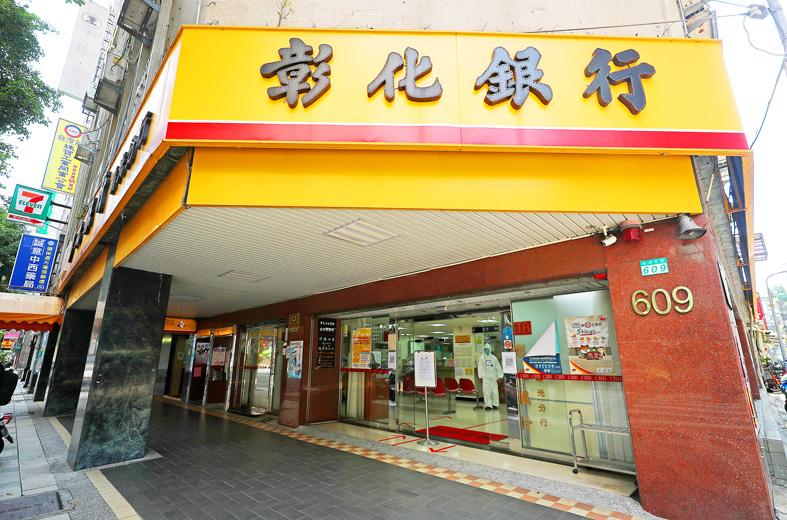State-run Chang Hwa Commercial Bank (彰化銀行) yesterday said it expects profitability to improve in the second half of the year, despite a lackluster showing in the first six months, as growing vaccination rates at home and abroad would make operating conditions more friendly.
The lender stood by its revenue target for this year, although net income for the first six months declined 1.84 percent to NT$4.17 billion (US$150.15 million), narrower than a retreat of 7.5 percent in the first quarter, Chang Hwa Bank spokesman Chen Bin (陳斌) told an online investors’ conference.
Earnings per share rose to NT$0.4, from NT$0.19 at the end of March.

Photo: CNA
The improvement came after the lender stepped up loans to small and medium-sized enterprises, while trimming lending to big corporations and government agencies.
Chang Hwa Bank’s loan-to-deposit ratio edged up to 76.39 percent last quarter, compared with 76.15 percent three months earlier, and should gain strength moving forward, officials said.
Revenue contributions from overseas outlets and offshore banking units stood at 35.1 percent, slowing from 37.5 percent for the whole of last year.
The downtrend might reverse in the second half, as the world further emerges from the COVID-19 pandemic, giving customers and the bank more confidence about doing business, officials said.
Likewise, the domestic market, which has taken a hit from a local COVID-19 outbreak, is expected to recover this or next month, as the number of confirmed cases has dwindled to single digits, while the vaccination rate has steadily increased, officials said.
Fee income shrank 0.32 percent in the first half though sales of wealth management products picked up mildly, officials said.
Net interest margin gained 3 basis points from the previous quarter to 0.89 percent, while the lending spread widened to 1.18 percent.
Chang Hwa Bank said it would raise its holdings of local shares during price corrections, guided by the principle of stability in dealing with investment funds.

In Italy’s storied gold-making hubs, jewelers are reworking their designs to trim gold content as they race to blunt the effect of record prices and appeal to shoppers watching their budgets. Gold prices hit a record high on Thursday, surging near US$5,600 an ounce, more than double a year ago as geopolitical concerns and jitters over trade pushed investors toward the safe-haven asset. The rally is putting undue pressure on small artisans as they face mounting demands from customers, including international brands, to produce cheaper items, from signature pieces to wedding rings, according to interviews with four independent jewelers in Italy’s main

Japanese Prime Minister Sanae Takaichi has talked up the benefits of a weaker yen in a campaign speech, adopting a tone at odds with her finance ministry, which has refused to rule out any options to counter excessive foreign exchange volatility. Takaichi later softened her stance, saying she did not have a preference for the yen’s direction. “People say the weak yen is bad right now, but for export industries, it’s a major opportunity,” Takaichi said on Saturday at a rally for Liberal Democratic Party candidate Daishiro Yamagiwa in Kanagawa Prefecture ahead of a snap election on Sunday. “Whether it’s selling food or

CONCERNS: Tech companies investing in AI businesses that purchase their products have raised questions among investors that they are artificially propping up demand Nvidia Corp chief executive officer Jensen Huang (黃仁勳) on Saturday said that the company would be participating in OpenAI’s latest funding round, describing it as potentially “the largest investment we’ve ever made.” “We will invest a great deal of money,” Huang told reporters while visiting Taipei. “I believe in OpenAI. The work that they do is incredible. They’re one of the most consequential companies of our time.” Huang did not say exactly how much Nvidia might contribute, but described the investment as “huge.” “Let Sam announce how much he’s going to raise — it’s for him to decide,” Huang said, referring to OpenAI

The global server market is expected to grow 12.8 percent annually this year, with artificial intelligence (AI) servers projected to account for 16.5 percent, driven by continued investment in AI infrastructure by major cloud service providers (CSPs), market researcher TrendForce Corp (集邦科技) said yesterday. Global AI server shipments this year are expected to increase 28 percent year-on-year to more than 2.7 million units, driven by sustained demand from CSPs and government sovereign cloud projects, TrendForce analyst Frank Kung (龔明德) told the Taipei Times. Demand for GPU-based AI servers, including Nvidia Corp’s GB and Vera Rubin rack systems, is expected to remain high,